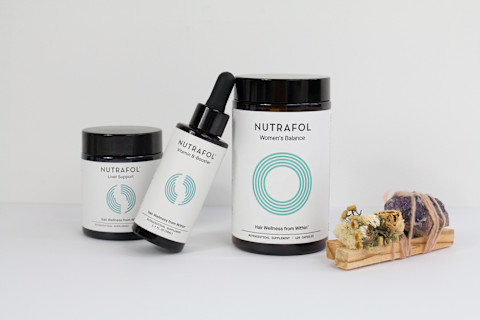Why Am I Shedding So Much Hair? These 4 Reasons Might Explain It (Plus, How To Combat It)

"It's just hair; it’ll grow back."
Who hasn't heard this before? We've all been taught to believe that if we just give it time, hair will do its one job—grow. And yet, bad haircuts can be borderline traumatic, and shedding a bunch of hair in the shower or a brush feels, TBH, kind of freaky.
We clearly have a deep emotional connection with our hair—and we're not just imagining it. Research has linked hair loss to low self-esteem, body image issues, and high stress. In fact, the Journal of the American Academy of Dermatology (AAD) recommends1 that docs assess for anxiety when diagnosing hair loss. So, how much hair loss is normal, exactly? (Because if you're reading this post, you're probably wondering.) According to the AAD, we shed about 50 to 100 hairs on average each day. If it feels like more than that for you, or if your hair has stopped growing in places altogether, keep reading.
The health factors that can cause hair loss.
As it turns out, the health of your hair is actually more holistically connected to your health and well-being than you might realize.
While it's easy to assess your parents' and grandparents' head of hair (or lack thereof) and accept the same fate, family genetics aren't the only factor in hair loss or thinning strands. Numerous systems in the body can affect hair loss, but on the bright side, peer-reviewed research published in the Journal of Drugs in Dermatology on women with self-perceived thinning hair has revealed that by targeting multiple root causes, hair growth is possible (and not just longer, but thicker, healthier, more voluminous hair). It's why Nutrafol's hair growth products for women and men, which are some of the leading products on the market that take this multi-targeting approach to hair health, are being recognized by the scientific and medical communities.
Read on below for some of the lesser-known factors that can cause your hair to shed, thin, and show you more of your scalp than you care to see:
Hormones
Hair loss can be triggered by changes in your hormone levels—menopause and the postpartum period after giving birth are common examples of that. The thyroid hormone is a major culprit, too: Your thyroid plays a role in providing a steady supply of new hairs to replace the ones you lose every day. But a thyroid that is underactive (hypothyroidism) or overactive (hyperthyroidism) may not fully replace the hairs that you normally lose, which can potentially lead to hair loss2.
Ever heard of dihydrotestosterone? This hormone (DHT for short) is a byproduct of testosterone that causes hair follicles to shrink, and it's the primary hormone responsible for hair loss in both men and women. Having high levels in the scalp or a sensitivity to it can cause a form of hair loss called androgenetic alopecia, or male or female pattern baldness (though for women, it's more like hair thinning than a receding hairline). And it's fairly common, affecting 50 million men and 30 million women.
This five-minute hair wellness quiz over at Nutrafol can help determine if you should be concerned about DHT—among evaluating other triggers that might be causing your hair to thin or shed—to give you an idea of what might be going on beneath the surface.

Stress
Ongoing stress, or majorly stressful situations like a breakup, a big move, surgery, or the loss of a job can cause hair loss3. When you're stressed out, your body goes into survival mode, rerouting its resources to meet the demands of whatever task is in front of you. And if the stress hormone cortisol lingers for too long, it can disrupt thyroid function, in turn affecting hair growth. The formula in both Nutrafol Women, Nutrafol Women's Balance, and Nutrafol Men includes botanical adaptogens like ashwagandha, which have been clinically shown to help chronically stressed adults put their cortisol levels back in place.
Toxins
It's not just the use of harsh hair care products or chemical treatments that can do a number on your hair's health. Exposure to environmental stressors, including UV rays, pollution, plastics, toxins from the household chemicals we use, and smoke, can lead to hair damage and even stunt hair growth, over time, through free radical damage.
Microbiome
As one of the most important factors in our overall health, our daily nutrition—and in tandem, our gut health—counts here, too. Research4 has linked nutritional deficiencies like iron and zinc with hair loss, but there's more to it than absorbing the right nutrients for growing healthy, thick strands of hair. A balanced microbiome can help calm an overactive inflammatory response (think allergens that affect the surface of the skin), which is key because hair follicles are affected by inflammatory processes just like every other organ in the body, according to research. Turns out, chronic levels of inflammation can slow the hair growth process and even cause hair to shed.
Like every other aspect of our well-being, hair care should be holistic. By addressing the multiple health factors that are known to cause hair loss or damage, with time, the right building blocks, and some TLC, our hair may just actually do its thing: grow.
